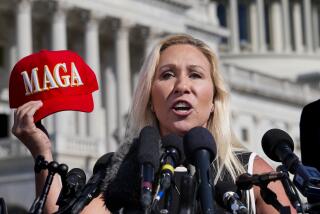Campaign Reformers Fight On
- Share via
WASHINGTON — Backers of campaign finance reform pledged Friday to continue to fight for the legislation, but it was far from clear whether the momentum that had pushed their cause to the brink of a decisive House vote this week can be recaptured.
Sponsors insisted the procedural snag that derailed their measure on Thursday was only a technical and temporary setback. But experts said the movement to reduce the role of big money in politics may have reached a high-water mark.
The planned House vote was the culmination of forces that began to gather five years ago with the campaign finance scandals of the 1996 election, gained speed during the presidential candidacy of Sen. John McCain (R-Ariz.) in early 2000 and reached a new plane when a reform bill cleared the Senate in April.
But that steady march came to an uncertain halt when the anticipated House vote was scuttled by a fierce partisan battle over the rules of debate. The deadlock cast doubt on whether the bill will return to the House floor for a vote.
“It’s clearly a setback,” said Larry Noble, executive director of the Center for Responsive Politics, a nonpartisan organization that tracks political fund-raising. “What is impossible to tell today is whether or not this is a glitch and the momentum will continue, or whether this is the pinprick that will take the air out of reform.”
Noble and others said the public’s reaction to the House events--as well as intense partisan maneuvering in the coming days--will likely determine whether the latest attempt at reform survives.
Republican House leaders who oppose the reform bill gave every indication Friday that they don’t intend to revisit it.
House Speaker J. Dennis Hastert (R-Ill.) “has focused on other things, he’s moved on,” said his spokesman, John Feehery. “I don’t think he’s going to focus on [campaign finance reform] for a long time, if ever.”
But sponsors of the House bill, Reps. Christopher Shays (R-Conn.) and Martin T. Meehan (D-Mass.), threatened Friday to throw the House into gridlock on other legislation, if necessary, to bring their measure back to the floor.
The measure would ban so-called soft money, the virtually unregulated and frequently large contributions to political parties that reformers charge corrupt the political process.
Shays and Meehan said that they are hoping the coming days will serve as a “cooling off” period, and that they will be able to reschedule a vote on the bill.
But they outlined a number of options if those talks don’t materialize, including gathering signatures for a discharge petition--a mechanism that would force a floor debate on their bill if the petition gets backing from a majority of the House’s 435 members.
Shays and Meehan used that tactic in 1998 to bring their legislation to the floor over the objections of then-House Speaker Newt Gingrich (R-Ga.), who backed down after the sponsors secured 204 signatures. The House went on to pass the reform bill by an overwhelming majority that year, and some experts say this week’s fight could have a similar effect.
“What happened [Thursday] is going to stiffen the backbone of people who felt they really were cheated out of a vote and a victory,” said Trevor Potter, an attorney and former chairman of the Federal Election Commission.
The bitter struggle in the House was characteristic of the long fight by reformers to overhaul campaign finance laws, an effort that has faced a variety of hurdles.
“We’re trying to take away the mother’s milk of politics,” said Sen. Russell D. Feingold (D-Wis.), a co-sponsor of the reform bill that passed the Senate. “It’s intoxicating and addicting, and almost everyone in the Congress was elected under this system.”
Campaign finance reform is opposed by some of the most influential lobbying groups in Washington, ranging from the National Rifle Assn. to labor unions to the American Civil Liberties Union.
With such entrenched resistance, some wonder whether the drive for reform can sustain any more setbacks.
“The Republican leadership is banking that there will develop out of this a sense of futility,” said Thomas Mann, a congressional scholar at the Brookings Institution. “Whether that works depends in large part on the leaders of the reform effort. It depends, for example, on what Shays is prepared to do.”
Shays, a generally loyal Republican who in the past appeared reluctant to battle his party, said Friday that he is now convinced he must.
Shays said he will encourage the other 18 Republicans who voted against the procedural rule Thursday to side with Democrats to derail other legislation on the GOP agenda. He also said he will seek to whip up public support by exposing details of his colleagues’ fund-raising efforts.
“I’m going to be very blunt about what we’re being asked to do,” Shays said, referring to fund-raising goals that the party imposes on committee chairmen, as well as the incessant calls that members make from nearby party offices to seek donations from corporations and well-heeled donors.
More to Read
Get the L.A. Times Politics newsletter
Deeply reported insights into legislation, politics and policy from Sacramento, Washington and beyond. In your inbox twice per week.
You may occasionally receive promotional content from the Los Angeles Times.










